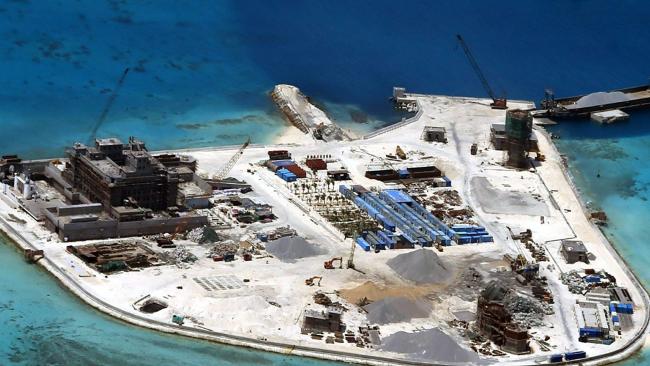Since the end of Second World War, the United States has been the leading military and economic power not just in the Americas, but in the world. This status is being challenged on an almost daily basis by a nation amassing more and more global power. According to the Yale Economic Review, China’s economy has been accelerating at a growth rate in the double digits.1 This presents a great concern for many involved in American foreign policy. A question persists: is China a friend or a foe of the United States? For many years, the fast-growing Chinese economy was troubling, but in recent years, the Chinese have also increased their military power by their amplified presence in the South China Sea. A few years ago, China made the unprecedented move of militarizing the South China Sea by constructing man made islands in the area over the Spratly Islands.2 Not only is the prospect of a more agile Chinese military a grave threat, but what does this mean for Chinese territorial waters? Does creating installations on artificial islands extend Chinese territorial claims into international waters? This question has been worrying many in foreign policy and leads to the second question of how can the U.S. prevent further encroachments by China? Fortunately, the UN Convention on the Law of Sea has the answer.3

Beginning in 2014, Chinese President Xi Jinping ordered his military to begin militarizing small patches of land in the South China Sea that are collectively called the Spratly Islands.4 The Spratly Islands are home to a wide array of oceanic life and are claimed not just by China, but also by the Philippines and Vietnam. President Xi Jinping refused to let these conflicting claims deter him from making his country’s military presence in the area greater and more mobile. Chinese military engineers began covering various islands in tons of additional sand to build them up and make them more stable. After this step, the Chinese military built communications towers and then, frighteningly, they constructed missile silos on these islands. China is also making sure no fishermen from the Philippines, nor individuals from any other nation come close to the artificial land masses.5. The United States’ Navy has performed many drills in the region that were harshly denounced by China who claims that the US Navy is threatening its sovereignty. This raises a series of other questions, however, as several other nations are declaring that the Spratly Islands fall within their exclusive economic zones.
According to the 1982 UN Convention on the Law of the Sea, territorial waters originate at a nation’s coastal baseline, which is the low water mark of a country’s ocean, and extend outward a distance of twelve nautical miles, or 13.8 land miles. Exclusive economic zones occur beginning at this baseline of territorial waters and extend two hundred nautical miles outwards. In addition to this clause, article 60 of the UN Convention states that as long as it is within a nation’s exclusive economic zone, the construction of artificial islands and their maintenance is sanctioned.6 This would seem as though it would settle the matter, but the primary issue is that while the Philippines, Malaysia, Brunei, and Vietnam are all claiming that the Spratly Islands lie within their exclusive economic zones, China is saying that historically, this region of the South China Sea belonged to them. They claim this because the waters used to belong to them, and their fisherman continue to fish there. China is frequently increasing the number of navy ships that patrol the islands to ensure that no other country can challenge their hold on the area. The Chinese government believes that since their fishermen and military have been using the islands for centuries, they possess a natural claim to them, despite what other nations say.7 Understandably, this poses a significant threat to the United States as China is already an economic powerhouse with a military that has increased its maneuverability. Hence, the reason why the United States’ government has been sending portions of its naval fleet to patrol the seas and routinely survey the area to see what China’s next move will be.

Actions like these are what make foreign policy experts wary of whether China is an ally rising up, or an enemy growing in both military and economic strength biding its time.8 The UN Convention on the Law of the Sea states explicitly that artificial islands in no way extends a nation’s territorial waters.9. While this may be the case, China does not seem to mind militarizing them and driving away anyone who gets too close to the Spratly Islands. When attempting to answer the China question, one must be cautiously optimistic. With their robust economy and the fact that they are major trading partners with the U.S., it is important not to automatically assume that they are a threat that must be dealt with. While it is not yet clear what China’s true intentions are, the Chinese nation presents at its best, a bullying and assertive friend, and at its worst, a belligerent and dangerous adversary.
- Sharon Yin, “Economic Growth and the Imbalance of Wealth Distribution in China ” Yale Economic Review, (March 11, 2013), accessed February 14, 2018, http://www.yaleeconomicreview.org/archives/378. ↵
- Sharon Yin, “Economic Growth and the Imbalance of Wealth Distribution in China,” Yale Economic Review, (March 11, 2013), accessed February 14, 2018, http://www.yaleeconomicreview.org/archives/378. ↵
- United Nations, The United Nations Convention on the Law of the Sea, (10 December, 1982) Montego Bay, 1982, http://www.un.org/depts/los/convention_agreements/convention_overview_convention.htm. ↵
- Mike Ives, “The Rising Environmental Toll of China’s Offshore Island Grab,” Yale E360, (October 10, 2016), accessed February 08, 2018, http://e360.yale.edu/features/rising_environmental_toll_china_artificial_islands_south_china_sea. ↵
- Mike Ives, “The Rising Environmental Toll of China’s Offshore Island Grab,” Yale E360, (October 10, 2016), accessed February 08, 2018, http://e360.yale.edu/features/rising_environmental_toll_china_artificial_islands_south_china_sea. ↵
- United Nations, The United Nations Convention on the Law of the Sea, (10 December, 1982) Montego Bay, 1982, http://www.un.org/depts/los/convention_agreements/convention_overview_convention.htm. ↵
- Suzanne S. Kimble, 2015, “Is China Making Waves in International Waters by Building Artificial Islands in the South China Sea?.” Tulane Journal Of International & Comparative Law 24, no. 1: 263-289, Legal Collection, EBSCOhost (accessed February 18, 2018). ↵
- Steven Stashwick, “China Signaling it May Finally ‘Militarize’ the South China Sea Officially.” The Diplomat, January 25, 2018. Accessed January 30, 2018. https://thediplomat.com/2018/01/china-signaling-it-may-finally-militarize-the-south-china-sea-officially/. ↵
- The United Nations Convention on the Law of the Sea, (10 December, 1982), Montego Bay, 1982, http://www.un.org/depts/los/convention_agreements/convention_overview_convention.htm ↵



39 comments
Daniel Linstead
This article was good to read, was something interesting to learn about that I didn’t know before. I think this highlights the fact that china are one of those countries that fly under the radar even though they can cause some trouble. We are so caught up in what Russia and North Korea are doing but maybe we need to be preparing for china.
Eloisa Sanchez Urrea
This article did a good job of giving background on the relationship between China and the US. The article slowly gave details that lead into the present issues with China. This was an interesting topic and one that although is very relevant can be forgotten. It would be in everyone’s best interest for these countries to remain allies, but it is not always that simple.
Honoka Sasahara
I think that keeping good relationships between countries is difficult because the situation changes every day. Therefore it is natural that certain nations are so close today even though they were enemies for each other in the past. I don’t have so much knowledge of the situation in these countries, however, I’m sure that it is depend on how they act from now on.
Robert Ruiz
This is an interesting subject I feel most people overlook. China is again, one of out biggest trade partners, so we must remain conscious of what we do. In saying that, with China government structure it is important to protect the US at all costs, and China has been known to be slightly unorthodox and we must take note of that. With their military growing also, we must not underestimate what the power of Chinese government has. Although I do not have a problem with China building artificial islands, I do have an issue with them militarizing them.
Jasmine Rocha
The way to prevent another war from breaking out the U.S should keep China as allies for the best interest of the people of the U.S and the Chinese people. If we get on China’s bad side it would be dangerous because both their economy and the military has increased faster than imagined. It could be also China’s best interest for the U.S and China to be allies because we are in debt with China and that helps the fact that leaves both China and the U.S in good terms because we owe them keeps us safe and gives China insurance.
Harashang Gajjar
Americans have grown up with the belief that the United States is the center of the universe — economically, politically, and militarily. But now we are being challenged in a new global economic battle, one that will take some tricky navigation to lead us to economic success.Seniors remember winning World War II and the generous Marshall Plan that helped Europe recover. Helping former enemies created global growth that helped America rebound. Baby Boomers remember Khrushchev pounding his shoe on the table and threatening to bury us only to watch the Soviet Union capitulate, the Berlin Wall torn down, and the spread of Western economics. Gen X and Gen Y came to maturity in a period of technology expansion that led to increased prosperity.
Bictor Martinez
It is best that we keep our distance away from the Southern China Sea. They built this artificial island for a reason so no one should come and visit. Keeping China as a friend is extremely important. One mistake can lead us in bad terms with China and next thing you know, they will be a constant threat which is extremely dangerous. I am not sure what China’s plan is, however minding your own business while keeping your eye out is we should consider doing.
Richard Morales
China is another superpower and it is in our best interest to stay on good terms with them. It is my opinion that America’s foreign policy is too hyperactive and must be toned down. We really shouldn’t meddle in the South China Sea. I believe that China is a friend now but can easily become a foe due to a simple misunderstanding. We live in an uneasy political climate and President Trump has recently been imposing tariffs on Chinese imports. The future of our relationship with China uncertain.
William Rittenhouse
This is how wars can start. A country wanting to claim territory that isn’t theirs or somebody elses and the other country says it’s theirs. It seems pretty clear that they have 2 purposes for being there. The first is economic as It sounds like the fishing industry there is pretty big. The second one is for military assertion and a show of power. This can be very dangerous. My friend attends West Point and he told me China is labled as one of the 3 major threats to the US apart from Russia and North Korea. They encourage their students to learn one of these languages as they will most likely be dealing with these countries in the future. Scary thought, but it’s best to stay prepared.
Greyson Addicott
China itself has always been an important player on the world stage. They fueled the East India Co in the 18th and 19th centuries, they kept the imperialist Japanese busy in the 20th century, and they headed the Communist revolution in Asia. I admire their persistence, and their devotion to Communist revolution. While I am not personally sympathetic to Maoist China, I do have to admit that I deeply respect their ambitions. The fact that they are now acting aggressively today is no surprise, they have been doing just that for centuries.